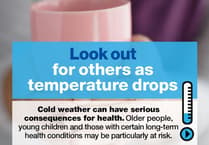NHS leaders in Devon are sharing tips to keep warm during the cold snap.
As temperatures drop, it is easier to pick up bugs and viruses and cold and damp conditions, ice, snow and high winds can make existing health problems worse and leave people more vulnerable to respiratory illnesses, and increasing the risk of slips and falls.
The South West’s top clinicians are sharing some simple steps to help.
Dr Rupa Joshi, GP and Medical Director for NHS England – South West said: ‘We want people to ensure that they are taking the best steps to keep themselves well this winter, especially in any cold weather snaps.
‘Keeping warm over the winter months can help to prevent colds, flu and more serious health problems such as heart attacks, strokes, pneumonia and depression.
‘If you can, you should be aiming for the main room you use during the day, and at night, to be at least 18 C, this is particularly important if you have a long-term health condition like heart failure or chronic airways disease.
'Wearing several thinner layers will keep you warmer than one thicker layer and it is also very important to ensure you are eating enough and having hot drinks when you can.’
Reducing draughts with curtains, draught excluder, waring layers of clothing and insulating boilers and pipes can help keep heating costs down.
Organisations across the region are available to provide help and advice while council and NHS websites have information on local resources and support.
Staying active is also an essential part of keeping warm this winter, and to help reduce the risk of falling ill in the colder months.
Dr Justin Varney-Bennett, Director of Public Health for NHS England South West said: ‘Being active everyday can help improve your mental health, reduce the risk of falling and can be beneficial for recovery if you do get ill.
'You should be aiming to do enough activity that will make you feel a little bit warmer but can still have a conversation.
‘Don’t do anything that doesn’t feel comfortable and trust your instincts about your own limits.
‘Try to reduce the amount of time you spend sitting down during the day and try not to sit still for more than an hour or so if you can.
'There are many activities you could do at home, such as walking up and down stairs, dancing, gardening, housework, or taking part in online fitness classes.
‘It doesn’t matter what you do, as long as it’s something you enjoy and keeps you moving.’
Remember other people, such as older neighbours, friends and family members, may need some extra help over the winter.
There is advice on keeping warm and well, as well as getting winter vaccinations on the NHS website.





Comments
This article has no comments yet. Be the first to leave a comment.